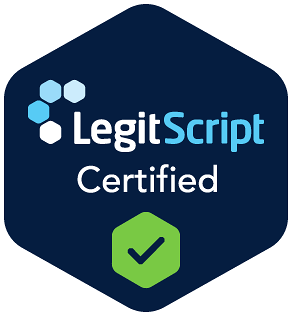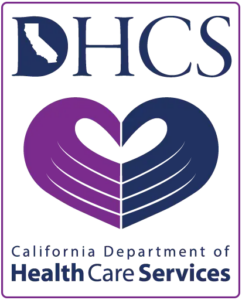Addiction affects millions of Americans, but recovery is possible with the right support system. Residential addiction treatment provides the intensive care and structured environment needed to break free from substance dependence.
We at Surf City Detox understand that choosing treatment represents a brave first step toward reclaiming your life. This comprehensive guide will help you navigate your options and find the path to lasting recovery.
How Does Residential Addiction Treatment Actually Work
Residential addiction treatment places individuals in a 24/7 supervised environment where they live at the facility for 30 to 90 days while they receive intensive therapy and medical care. Unlike outpatient programs, residential treatment removes all external triggers and distractions. This creates a controlled space where recovery becomes the sole focus. The National Institute on Drug Abuse reports that individuals in residential programs show significantly higher completion rates compared to outpatient alternatives, with structured environments that prove most effective for those with severe addiction or multiple failed attempts at sobriety.
The Medical Foundation That Makes Recovery Possible
Medical supervision forms the backbone of effective residential treatment. It starts with professionally managed detoxification that monitors vital signs and administers medications to reduce withdrawal symptoms. Staff-to-patient ratios typically range from 1:4 to 1:6, which allows for individualized medical attention that outpatient settings cannot provide. Evidence-based therapies like Cognitive Behavioral Therapy and Dialectical Behavior Therapy are delivered through individual sessions three to five times weekly. These combine with daily group therapy sessions that build peer support networks. Research shows that programs incorporating both individual and group therapy approaches demonstrate improved effectiveness in supporting long-term recovery outcomes.
Who Needs Residential Treatment Most
Residential care works best for individuals with severe physical dependence, those who have relapsed multiple times in outpatient treatment, and people who face co-occurring mental health disorders like depression or PTSD that complicate recovery. The Commission on Accreditation of Rehabilitation Facilities identifies residential treatment as the gold standard for individuals whose home environments contain active addiction triggers or lack family support systems. People with professional responsibilities often worry about extended time away (but studies consistently show that incomplete outpatient attempts cost more in lost productivity and medical expenses than one comprehensive residential stay).
The Structure That Creates Success
Daily schedules in residential programs typically include health checks, therapy sessions, wellness activities, and peer support groups that maintain consistent progress toward recovery. Participants follow structured routines that replace chaotic addiction patterns with healthy habits and accountability measures. Most programs require 30 to 90 days of continuous residence (depending on individual needs and progress), which allows sufficient time for both physical healing and psychological transformation.
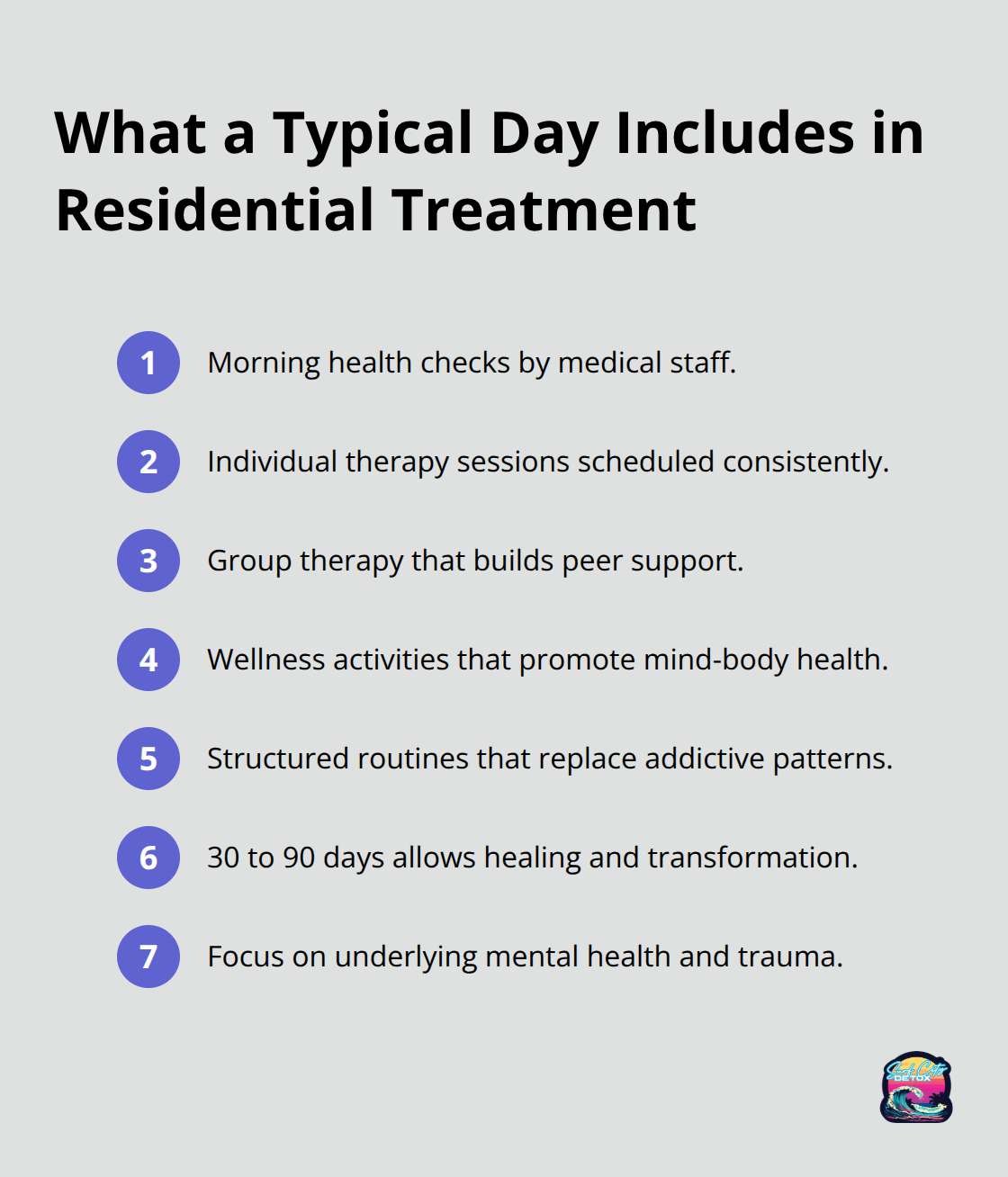
This intensive approach addresses not only the addiction but also the underlying causes related to mental health and trauma that often drive substance use.
The evidence shows clear advantages for residential treatment, but success depends heavily on selecting the right program that matches your specific needs and circumstances.
How Residential Treatment Transforms Lives
Residential treatment transforms lives through evidence-based therapies that target the brain’s addiction pathways directly. Cognitive Behavioral Therapy sessions occur three to five times weekly and teach clients to identify negative thought patterns that trigger substance use. Research shows that relapse rates for substance use disorders range from 40-60%, highlighting the importance of comprehensive treatment approaches. Dialectical Behavior Therapy focuses on emotional regulation skills, with clients who practice distress tolerance techniques daily through structured exercises. Eye Movement Desensitization and Reprocessing therapy addresses trauma in participants who complete structured sessions. These therapies work because they rewire neural pathways damaged by addiction and create new responses to stress and triggers.
Evidence-Based Therapies That Create Lasting Change
Medical professionals deliver individual therapy sessions that address specific addiction triggers and underlying mental health conditions. Trauma-informed care approaches help clients process past experiences that fuel substance use patterns. Group therapy sessions provide peer support while participants learn from others who face similar challenges. Family therapy repairs damaged relationships and establishes healthy communication patterns that support recovery at home. Research shows that programs which combine multiple therapeutic approaches demonstrate improved effectiveness in supporting long-term recovery outcomes (with success rates increasing when trauma therapy is included).
Life Skills That Prevent Relapse
Effective residential programs teach practical life skills through hands-on training rather than theoretical discussions. Clients learn financial management when they create budgets and track expenses during treatment. Communication workshops practice conflict resolution through role-playing scenarios with family members and peers. Job readiness training includes resume preparation, interview practice, and workplace stress management techniques. Research from the Substance Abuse and Mental Health Services Administration shows that individuals who complete skills-based programs maintain higher employment rates than those who receive therapy alone. Time management becomes essential as clients structure days without substances and learn to fill hours previously consumed by drug-seeking behaviors.
Community Connections That Support Recovery
Residential treatment builds recovery foundations through peer relationships that extend beyond discharge. Group therapy sessions create accountability partnerships where participants share contact information and commit to regular check-ins post-treatment. Alumni programs connect recent graduates with individuals who have maintained sobriety for years and provide mentorship and ongoing support. CARF is the only entity approved by the American Society of Addiction Medicine to certify residential substance use disorder treatment services. These connections become the support system that prevents isolation (a primary relapse trigger identified by addiction specialists nationwide).
The transformation process requires the right environment and program structure, which makes selecting an appropriate facility the next critical decision in your recovery journey.
How Do You Choose the Right Treatment Center
Accreditation stands as the most important factor when you evaluate residential treatment facilities. The Joint Commission and the Commission on Accreditation of Rehabilitation Facilities represent the gold standards for addiction treatment centers. Only facilities that meet rigorous clinical and safety requirements earn these certifications. Staff credentials matter equally-look for programs where licensed addiction counselors, medical doctors, and mental health professionals deliver care rather than unlicensed technicians. Insurance verification becomes critical since residential treatment costs range from $30,000 to $60,000 for 30-day programs according to the National Center on Addiction and Substance Abuse. Treatment centers that accept your specific insurance plan and provide transparent prices avoid surprise bills that derail recovery plans.
Questions That Reveal Program Quality
Ask treatment centers about their staff-to-patient ratios when you schedule your initial consultation. Quality programs maintain ratios between 1:4 and 1:6, while understaffed facilities often exceed 1:10 ratios that compromise individualized care. Request specific information about therapy schedules-effective programs provide individual therapy three to five times weekly plus daily group sessions.
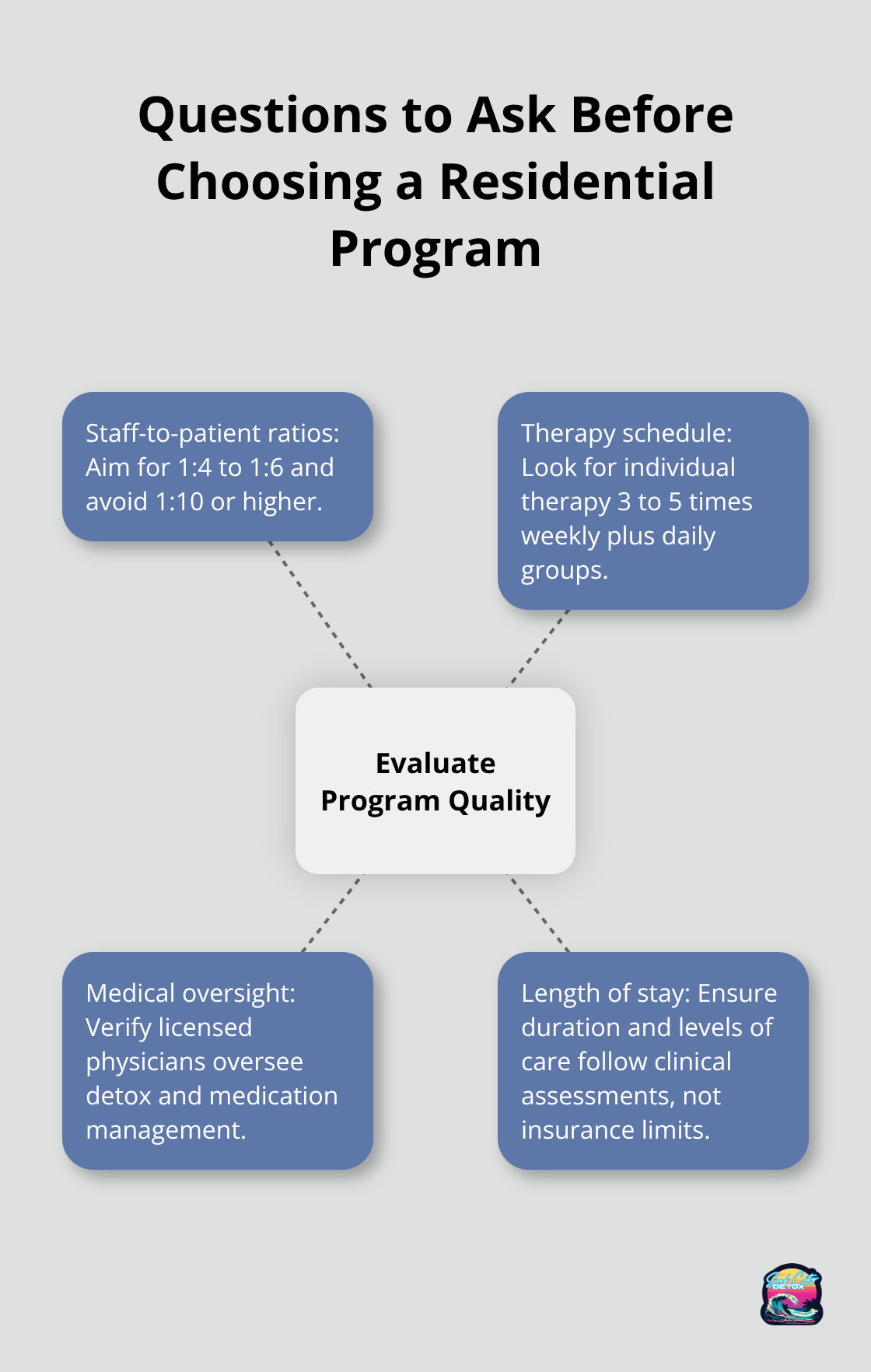
Medical supervision requirements vary dramatically, so confirm that licensed physicians oversee detox and medication management rather than nurses who work independently. Length of stay policies reveal program philosophy with evidence-based centers that provide multiple levels of care based on individual assessments rather than insurance limitations or fixed timeframes.
Warning Signs That Signal Poor Care
Facilities that guarantee success rates or promise quick fixes demonstrate fundamental misunderstandings of addiction treatment. Research shows that genetics account for 40 and 60 percent of a person’s risk of addiction, making success guarantees impossible and misleading. Avoid programs that refuse family involvement or discourage questions about treatment methods, staff qualifications, or facility operations. High-pressure sales tactics, demands for immediate payment, or refusal to provide references from former clients indicate profit-driven rather than patient-centered approaches. Programs that lack medical staff on-site 24/7 or outsource detox services to hospitals create dangerous gaps in care during the most vulnerable treatment phase (when medical complications can arise without warning).
Red Flags in Treatment Philosophy
Centers that focus solely on detox without comprehensive therapy fail to address the psychological aspects of addiction. Programs that discourage medication-assisted treatment for opioid addiction ignore evidence-based protocols that reduce overdose deaths by up to 50%. Facilities that prohibit contact with family members or restrict communication create isolation that hinders recovery progress.
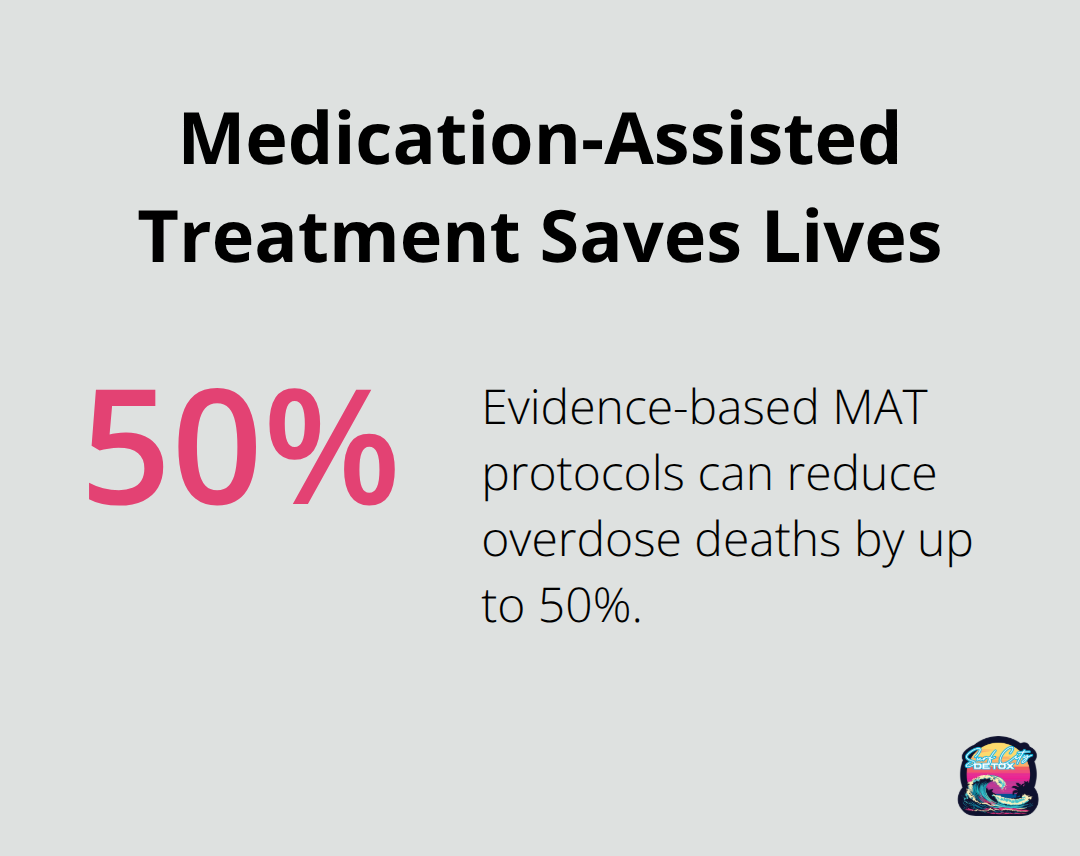
Treatment centers that use confrontational or shame-based approaches contradict modern addiction medicine principles and can cause psychological harm to vulnerable clients.
Final Thoughts
Residential addiction treatment offers the most comprehensive path to lasting recovery because it addresses addiction as the complex medical condition it truly is. The evidence shows that individuals who complete residential programs maintain higher sobriety rates than those who attempt recovery through outpatient care alone. The 24/7 medical supervision, intensive therapy schedules, and peer support networks create an environment where recovery becomes possible even for those who have struggled with multiple relapses.
Professional treatment teams understand the challenges you face and have the clinical expertise to guide you through each phase of recovery safely and effectively. You don’t have to face this journey alone when qualified professionals stand ready to support your transformation. The courage to take the first step toward recovery opens the door to a life free from substance dependence (and the pain that comes with it).
We at Surf City Detox provide medically supervised detox and dual diagnosis care for co-occurring mental health conditions in our facility. Our accreditation and personalized approach allow us to address the root causes of addiction through evidence-based treatment methods. Contact our compassionate intake specialists today to verify your insurance and begin your transformation toward a healthier, substance-free future.

